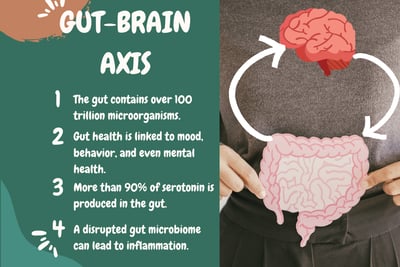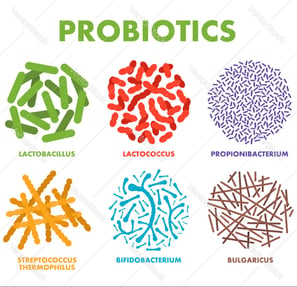Unlocking the Secrets of the Microbiome: How Gut Health Shapes Mental Wellness
Discover how your gut health affects your mental wellness through the gut-brain axis. Learn about the role of probiotics, the impact of stress and diet, and lifestyle changes for a healthier mind and body.
Key Facts:
The gut contains over 100 trillion microorganisms, collectively known as the microbiome.
Gut health is linked to mood, behavior, and even mental health disorders like anxiety and depression.
More than 90% of serotonin, a key neurotransmitter for mood regulation, is produced in the gut.
A disrupted gut microbiome can lead to inflammation, which is linked to various mental health conditions.
Probiotics and prebiotics have shown promise in improving both gut health and mental well-being.
What is the Gut-Brain Axis?
The connection between your gut and brain is an extraordinary one, often referred to as the gut-brain axis. This two-way communication system allows the gut and brain to send signals to each other through various pathways, including the nervous system, immune system, and hormonal changes. The vagus nerve, the body's longest cranial nerve, is a major highway that allows these messages to flow. In recent years, scientists have discovered that your gut microbiome plays a pivotal role in this connection, affecting your mental and emotional health just as much as it influences physical health.
The growing body of research shows that an imbalance in gut bacteria, known as dysbiosis, can negatively impact your mental state, contributing to conditions such as anxiety, depression, and even cognitive decline (1).


How the Microbiome Affects Mental Health
Gut Health and Inflammation
The gut microbiome is also deeply connected to your immune system. When harmful bacteria outweigh the beneficial ones, it can trigger an immune response, leading to chronic inflammation. Inflammation, in turn, has been linked to various mental health issues, including depression. Studies have shown that people with depression often have higher levels of inflammation, particularly pro-inflammatory cytokines, which can cross the blood-brain barrier and influence brain function (3).
An inflamed gut can lead to increased intestinal permeability, sometimes referred to as "leaky gut." This condition allows harmful substances to enter the bloodstream, further triggering inflammation in the brain. Researchers have found that addressing gut inflammation may offer new ways to treat or prevent mental health conditions like depression.


The Role of Probiotics and Prebiotics
The good news is that you can positively influence your gut microbiome through diet and lifestyle changes. Probiotics—live bacteria that are good for your health—can help restore the balance of the microbiome. Probiotic-rich foods like yogurt, kefir, sauerkraut, and miso can increase the number of beneficial bacteria in your gut, promoting a healthier gut-brain axis.
In addition to probiotics, prebiotics—non-digestible fibers that feed beneficial bacteria—also play an important role in maintaining a healthy gut. Foods like garlic, onions, bananas, and whole grains are rich in prebiotics. Together, probiotics and prebiotics support the production of neurotransmitters and the reduction of inflammation, which can improve mental health.
A study published in Frontiers in Psychology found that individuals who regularly consumed probiotic-rich foods had lower levels of anxiety and depression compared to those who didn’t (4).
How Stress and Diet Affect the Microbiome
Stress has a profound impact on the gut, with studies showing that chronic stress can alter the composition of gut bacteria, leading to dysbiosis. When you're stressed, your body releases cortisol, a hormone that can upset the balance of microorganisms in the gut. Over time, this can make you more vulnerable to mental health disorders.
Interestingly, diet plays a significant role in determining the health of your microbiome. Diets high in processed foods, sugar, and unhealthy fats can contribute to inflammation and gut imbalances. Conversely, a diet rich in fruits, vegetables, lean proteins, and fiber promotes a diverse and healthy microbiome. This, in turn, supports a balanced mood and reduces the risk of mental health issues.
Research published in the American Journal of Psychiatry revealed that a Mediterranean diet, rich in plant-based foods and healthy fats, was associated with a reduced risk of depression (5)
Can Gut Health Help Treat Mental Illness?
While improving gut health is not a standalone treatment for mental illness, it can be a complementary approach to traditional therapies such as medication and psychotherapy. Research into "psychobiotics"—a new class of probiotics aimed at improving mental health—is showing promising results. These specialized probiotics may enhance mood, reduce anxiety, and improve cognitive function by promoting healthy gut bacteria.
A study conducted by the University of Cork in Ireland found that individuals who took psychobiotics had improved mental health outcomes, including reduced anxiety and depression symptoms, compared to a control group (6). The research suggests that psychobiotics could be an innovative tool for managing mental health alongside other treatments.


Conclusion
Your gut is more than just an organ for digestion—it's a key player in your emotional and mental health. The microbiome influences everything from mood to cognitive function and even your risk of mental health disorders. By paying attention to your gut health through diet, lifestyle changes, and possibly probiotics, you can not only support your physical health but also boost your mental well-being.


One fascinating discovery is that more than 90% of serotonin is produced in the gut (2). Serotonin is often referred to as the "feel-good" hormone, playing a significant role in mood stabilization, happiness, and feelings of well-being. If your gut health is compromised, it can interfere with serotonin production, leading to mood disorders like depression and anxiety.
Your gut is home to trillions of microorganisms, including bacteria, fungi, and viruses. While some are harmful, many are beneficial and crucial to your health. These microorganisms help digest food, synthesize vitamins, and keep harmful invaders at bay. However, their influence extends beyond digestion. Your microbiome can influence the central nervous system through the production of neurotransmitters like serotonin and dopamine, which regulate mood and emotional responses.
Lifestyle Changes to Support Gut and Brain Health
Supporting both gut and mental health doesn’t require drastic measures. Small, daily changes can have a significant impact. Here are some lifestyle habits that can help:
Eat a diverse diet: Aim for a variety of fruits, vegetables, whole grains, and fermented foods to foster a healthy microbiome.
Exercise regularly: Physical activity helps stimulate the growth of beneficial bacteria and reduces stress levels.
Manage stress: Practices like yoga, meditation, and deep-breathing exercises can lower cortisol levels, benefiting both your gut and mind.
Sleep well: Poor sleep can disrupt your gut microbiome, so aim for 7-9 hours of quality rest each night.
Avoid unnecessary antibiotics: While antibiotics are crucial for fighting bacterial infections, overuse can harm your gut microbiome by killing off beneficial bacteria.
Explore More

Subscribe
Get new blogs in your Emails


